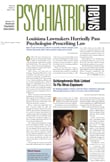In efforts to reverse nationwide trends in underage drinking, the Substance Abuse and Mental Health Services Administration (SAMHSA) has joined forces with teachers, families, and national organizations to educate preteens about the dangers of underage alcohol consumption.
In the “Too Smart to Start” program, SAMHSA is partnering with organizations such as the AMA, Mothers Against Drunk Driving, and the National Council on Alcoholism and Drug Dependence to distribute materials that aim to enhance communication between parents and children about underage alcohol use and include facts on alcohol use patterns of 9- to 13-year-olds.
The program’s Web site also includes information for adolescents and parents about the effects of alcohol on the brain. Alcohol damage to the hippocampus, according to the Web site, can be responsible for “impairing memory, altering perception of spatial relationships, causing dependence, and causing depression. . . .”
Data from SAMHSA’s 2002 National Survey on Drug Use and Health revealed that more than 11 percent of 12-year-olds reported using alcohol at least once in their lives, and twice as many reported using alcohol by the age of 15.
“We have to reach out to 9- to 13-year-olds now, before they drink, and provide health messages that will resonate with them and their parents,” SAMHSA Administrator Charles Curie said in a press release last month.
Program materials have already been field tested in a number of cities, including Pittsburgh, Miami, and Portland, Ore., where a pizza parlor placed local youths’ messages and illustrations about the dangers of underage drinking on the inside of its pizza boxes as a creative way to reach community members.
Also, last month SAMHSA launched its third annual “Reach Out Now” program, which features “teach-ins” or lectures by public figures such as governors’ wives speaking to fifth graders in every state on the dangers of underage drinking .
Each year, SAMHSA collaborates with Scholastic Inc. to reach 100,000 classrooms and around 3 million students in the United State. Scholastic is a company that produces educational products and provides services to schools around the country.
As part of “Reach Out Now,” schools provide materials that educate teachers, students, and their families about the dangers of underage alcohol use and help children develop skills they need to reject alcohol when it is offered to them.
More information about “Too Smart to Start” is posted online at www.toosmarttostart.samhsa.gov and information about Reach Out Now is available at www.teachin.samhsa.gov. ▪
